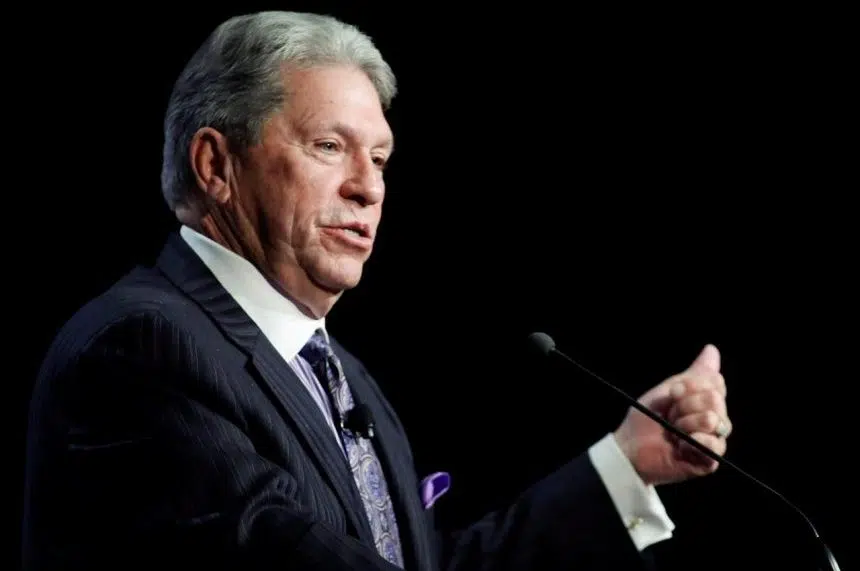JACKSONVILLE,, United States — Hunter Harrison, the plain-spoken, gruff American who rewrote the Canadian railroading book during his years heading both of this country’s largest railways, has died. He was 73.
CSX Corp., the American railroad Harrison began leading earlier this year, issued a statement on Saturday announcing his death.
The company attributed his death to “unexpectedly severe complications from a recent illness,” the same reason offered when Harrison formally went on medical leave earlier this week.
“The entire CSX family mourns this loss. On behalf of our Board of Directors, management team and employees, we extend our deepest sympathies to Hunter’s family,” CSX (NASDAQ:CSX) said in the statement. “Hunter was a larger-than-life figure who brought his remarkable passion, experience and energy in railroading to CSX.”
Ewing Hunter Harrison was born in Memphis, Tenn., on Nov. 7, 1944, and began his railroad career in 1964 as a 19-year-old rail car oiler for the St. Louis-San Francisco Railway while attending Memphis State University.
His modest start gave no hint that he would eventually serve as the CEO of four major railroads: Chicago-based Illinois Central Railroad, Montreal-based Canadian National Railway, Calgary-based Canadian Pacific Railway and Jacksonville, Fla., railway CSX Corp.
Harrison joined the Burlington Northern Railroad in 1980 when it purchased the St. Louis-San Francisco Railway, and he was eventually promoted to vice-president of transportation and service design.
Harrison left Burlington Northern in 1989 to become chief operating officer at Illinois Central Railroad, rising to president and CEO in 1993. There, he was credited with initiating scheduled service for freight, a revolutionary concept for the industry.
In 1998, Canadian National bought Illinois Central — considered at the time to be the most efficient railway in North America — and Harrison was appointed CN’s chief operating officer.
He became CEO of CN in 2003, succeeding Paul Tellier, and served in that position until his retirement at the end of 2009. He moved to his estate in Connecticut, where he raised and trained horses for show jumping.
In the fall of 2011, Harrison was approached by activist investor Bill Ackman, head of hedge fund Pershing Square Capital Management, and enlisted to help with a proxy battle at CP Rail. After winning the crucial vote at the annual shareholder meeting in 2012, Ackman appointed Harrison as CEO, replacing Fred Green.
In early 2017, Harrison abruptly resigned from CP, five months earlier than scheduled.
He gave up stock options and other compensation worth a total of $122.9 million to become CEO of CSX, a U.S. competitor, although he was later reimbursed by CSX.
Throughout his career, Harrison was adored by retail investors who rewarded his cost-cutting and attention to making the trains run as efficiently as possible by bidding higher on the shares of the railroads he headed.
As an illustration, CSX shares plunged nearly 10 per cent on Dec. 15, the morning after it announced he was taking medical leave and would be temporarily replaced by chief operating officer Jim Foote.
Unions were enraged by the thousands of job reductions he ordered. And they complained safety was compromised when he ordered managers and office workers at CP Rail be trained so that they could drive locomotives if union members went out on strike.
Institutional investors complained his compensation and perks were excessive and CP Rail moved to scale them back after he left.
“Professionally, Hunter was unmatched in this industry. He will go down as the best railroader ever, plain and simple,” said Keith Creel, Harrison’s hand-picked successor at CP Rail said in a statement released Saturday.
“What he has done at multiple railroads and for our industry the last 50-plus years is incredible which includes bringing CP back to its rightful place among leaders in the Class 1 space in what some have called the greatest corporate turnaround in history.”
Foote — who worked with Harrison for 11 years at CN Rail and joined him at CSX in mid-2017 — said Harrison’s positive influence on CSX’s performance would continue without him.
“I believe that the battleship has turned … Because the team has implemented a foundation consistent with Hunter’s vision, I do not see any reason to diminish our expectations concerning the pace and magnitude of our future progress,” he said in a statement on Dec. 14.
Luc Jobin, the current CEO of CN Rail, offered his condolences to Harrison’s family and paid tribute to the railway executive.
“Hunter was a giant of the railway industry for decades and a transformative figure at CN,” Jobin said in a statement issued Saturday.
— By Dan Healing in Calgary







